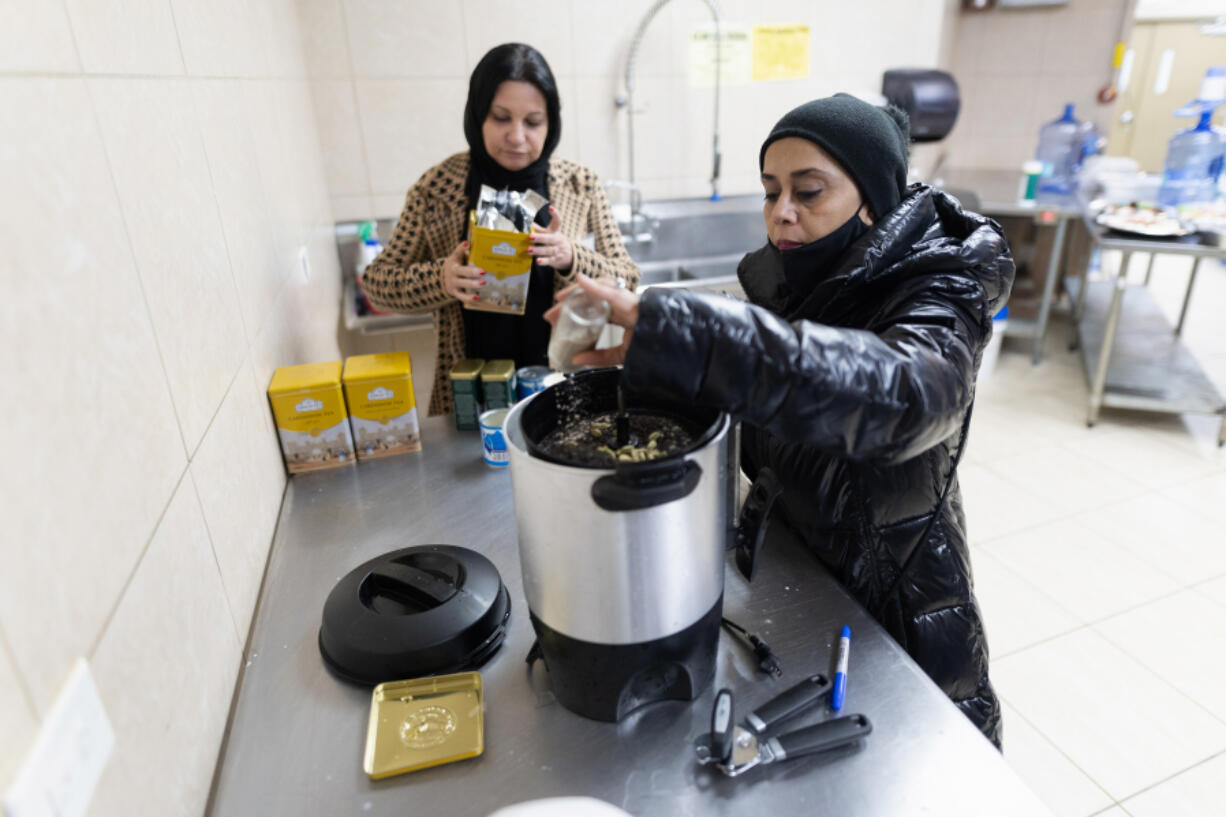CHICAGO — On a recent Sunday evening, a group of Muslim women huddled around a hot beverage dispenser. They watched as one woman mixed cardamom tea, anise seed, cinnamon, ginger and different kinds of milk.
It would be easier to offer hot water and tea bags, Sam Bawamia said as she stirred the warm beverage. But she had recently read that tea bags contain countless microplastic particles and, horrified, had decided to prepare the drink from scratch.
“We have to go green. You have to tell people — no plastics! Look at all these plastic bottles,” she said as she pointed to some shelves in the back of the kitchen stocked with single-use water bottles. “You have to say: ‘No, no, no.’”
The Muslim Community Center where Bawamia champions green initiatives has mosques in Chicago and Morton Grove, two of many across the world that face an environmental challenge particular to the month of Ramadan. Providing a meal and water to hundreds of people who haven’t had anything to eat or drink all day requires straightforward, replicable solutions — usually in the shape of disposable plastic plates, utensils and cups — and can often result in food waste.
“In our faith, in the Islamic faith, we are taught that we are the caretakers of the Earth,” Bawamia said, taking the podium for a short speech before sundown. “We humans use its resources, but we must maintain a balance. In the Quran … it says that (there’s) a delicate balance with which this world was set in motion. But our job is to correct our overuse of resources and address the injustices and effects of selfish change in the Earth.”
Efforts toward a “Green Ramadan” in the Muslim Community Center began last year, Bawamia said, years after she first noticed the waste produced was “not in the spirit” of the holy month and its emphasis on self-restraint.
“I think it’s ironic that we sacrifice hugely all day but then fill so many bins with plastic that is used once,” she said.
Bawamia’s co-chair of the center’s Green Team committee, Anjum Ali, said in an earlier conversation with the Tribune that the women couldn’t sleep at night thinking about the waste produced in a single night of hosting dinner for hundreds of people during Ramadan.
In the basement of the Morton Grove mosque, an inconspicuous box of paper cups stood by the kitchen door. A word had been scribbled on it upside down: “iftar,” the breaking of the fast.
As the clock struck 7 p.m., families reached for plates of dates and glasses of water, ending their daily fast. On both sides of the room, long serving tables were mostly empty, awaiting dinnertime, which would commence after the sunset prayer. Paper plates, napkins and compostable utensils bookended the tables.
Ali said that patience, or perseverance, constitutes a big concept in Islam.
“It means enduring, and it also means doing your best, the best that you can given your circumstances,” she said. “So this concept of having tolerance for a little bit of discomfort because it’s for the greater good — that is, to me, the definition of what we call Sabr.”
Now in their second year advocating for a green Ramadan, Ali and Bawamia have done away with styrofoam dinnerware and are selling stainless steel water bottles, which they encourage guests to refill from water fountains in the building.
“Unfortunately, as you leave, you might still see plastic water bottles,” Bawamia told mosque attendees. “Overall, it’s a work in progress. It’s difficult for a whole community to change. But just as we have all gotten used to carrying our phones everywhere, we can remember to bring our reusable (bottles) too.”
The mosque’s board, she said, has acknowledged the Green Team as a permanent committee since last year — a big step toward more sustainable practices within the faith community.
As Ramadan comes to a close, Bawamia and Ali hope to carry on these initiatives of restraint and moderation, making their faith community friendlier to the environment. In years past, the women secured support from an imam, or mosque leader, to switch the lightbulbs in all the fixtures — even the elaborate chandeliers — to energy-efficient ones. The water fountains installed in the mosques are another of their proud accomplishments.
In asking their fellow Muslims to join them in this journey, Ali said, they are asking them to nourish their mind, body, soul and the Earth, “because we can’t do anything outside that context.”
“Observe how the buzzing bees are moving, and notice how much water you use when you turn on a faucet,” Bawamia said. “Let’s be more mindful. At times, when the world’s problems are so big, we can focus on the small actions that make an impact.”



